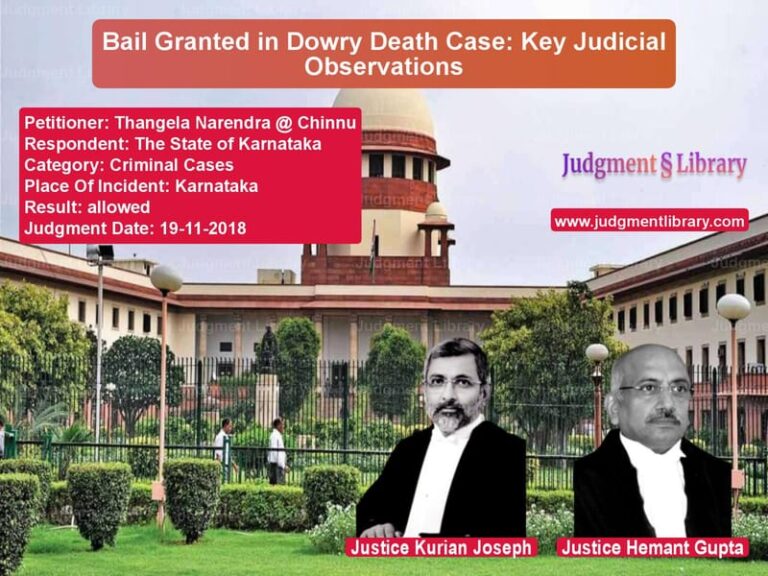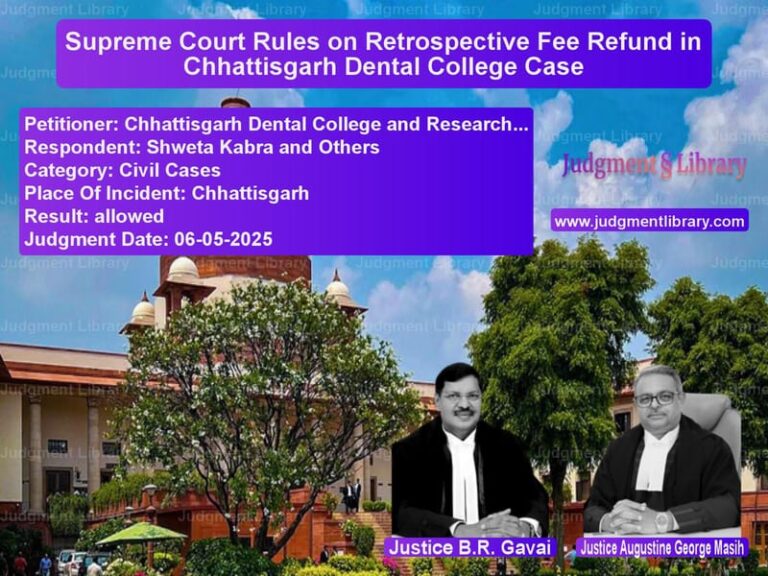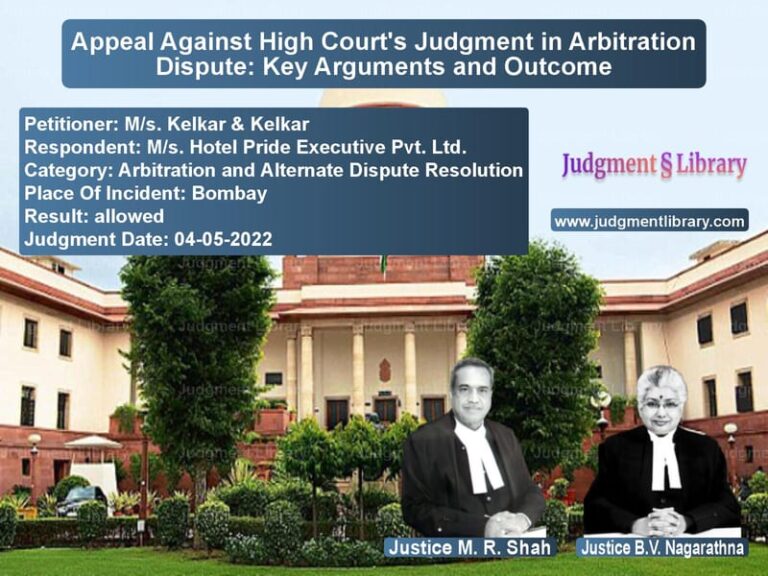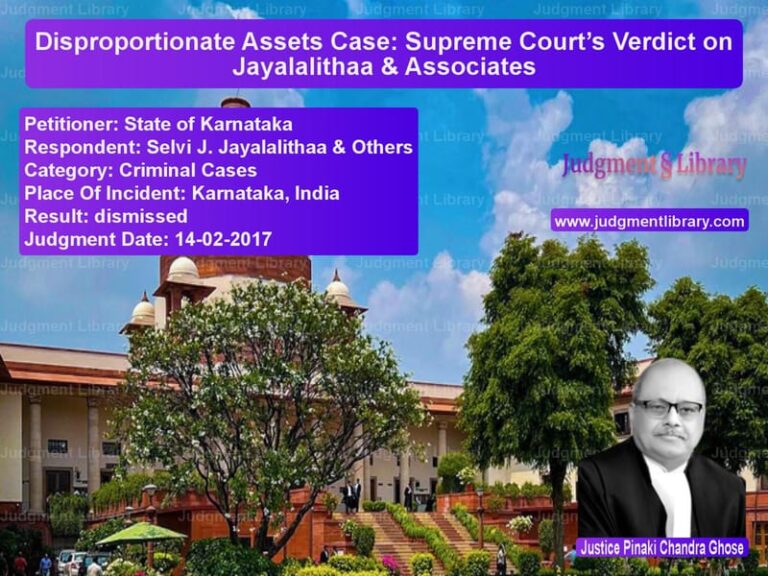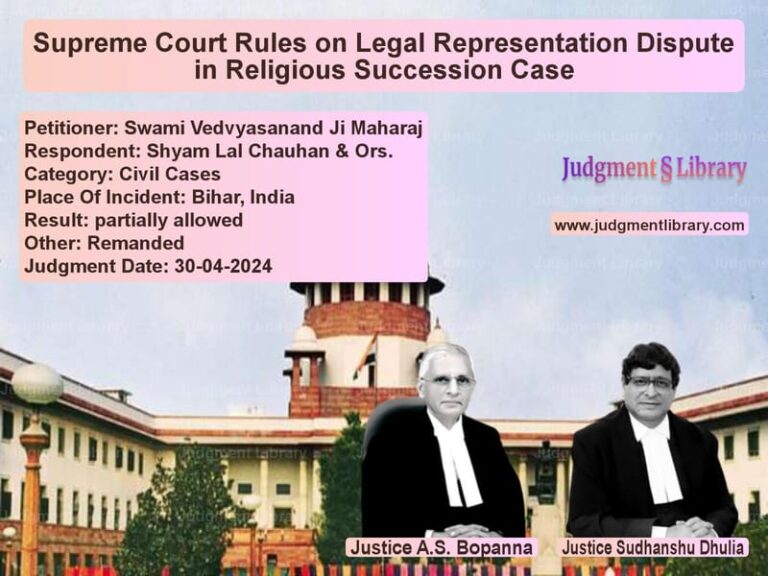Supreme Court Rules on Land Conversion Charges: State of Odisha vs. Bichitrananda Das
The Supreme Court, in its judgment on December 18, 2019, in the case of State of Odisha vs. Bichitrananda Das, ruled on the matter of land conversion charges in Bhubaneswar. The Court addressed the question of whether the conversion charge should be calculated based on the rate at the time of application or at the time of final decision-making.
Background of the Case
The dispute arose from the respondent, Bichitrananda Das, who had applied for the conversion of his leasehold property into freehold land in 2003. However, the Odisha government had denied the request on the ground that the respondent had encroached upon government land in front of his property. Despite multiple communications, the conversion request remained unresolved for over a decade.
The respondent challenged the government’s decision before the Orissa High Court, which ruled in his favor and directed the state to compute the conversion charges based on the rates applicable in 2003. Aggrieved by this, the State of Odisha filed an appeal before the Supreme Court.
Legal Issues Before the Supreme Court
- Whether the conversion charges should be calculated based on the rate prevailing at the time of the application (2003) or at the time of approval (2014).
- Whether the respondent’s alleged encroachment disqualified him from availing of the conversion policy.
- Whether the delay in processing the application should benefit the applicant.
Arguments by the Appellant (State of Odisha)
- The government argued that as per its policy, applicants must not have encroached upon government land to qualify for land conversion.
- The respondent had been found to have encroached on government land in 2004 by fencing off an area for personal use.
- The policy required that applicants must not be in unauthorized occupation of any government land, and the respondent had failed to meet this requirement.
- The conversion rate should be determined as per the rates applicable at the time of final decision-making, not at the time of application.
Arguments by the Respondent (Bichitrananda Das)
- The respondent contended that he had responded to the encroachment notice and had clarified that there was no unauthorized occupation.
- Since the government took an inordinately long time (over 12 years) to process the application, the conversion charges should be calculated based on the rate prevalent in 2003 when he had applied.
- He argued that he was eligible for conversion and that the government had acted arbitrarily by delaying the decision.
Supreme Court’s Judgment
The Supreme Court ruled in favor of the State of Odisha and set aside the Orissa High Court’s decision. The Court observed:
“The submission of an application does not confer a vested right for permission. The applicant must comply with the terms of the policy.”
The Court further stated:
“An applicant who seeks the benefit of the policy must comply with its terms. In this case, the policy clearly stipulated that a lessee who has encroached upon or unauthorizedly occupied government land anywhere within Bhubaneswar Municipal Corporation limits would not be eligible to be covered by the scheme unless the unauthorized occupation is vacated.”
The Supreme Court held that since the respondent was found to have encroached upon government land, the delay in processing the application was attributable to his non-compliance. Therefore, he was not entitled to demand that the conversion charges be calculated at the 2003 rate.
Key Takeaways from the Judgment
- Applicants must fulfill all conditions of government policies to be eligible for benefits such as land conversion.
- Encroachment on government land disqualifies an applicant from availing of conversion benefits unless the encroachment is removed.
- Conversion charges should be determined as per the rates prevailing at the time of final decision-making, not at the time of application.
- Delays caused due to non-compliance by the applicant cannot be used as a ground to claim lower conversion charges.
Final Decision
- The Supreme Court allowed the appeal and set aside the Orissa High Court’s ruling.
- The Court held that the respondent must pay the conversion charges as per the rates applicable at the time of final decision-making.
- The application for conversion would be processed once the respondent complied with all the necessary requirements.
Implications of the Judgment
This ruling sets a precedent for land conversion policies and the applicability of rates. It reinforces that compliance with policy terms is essential for availing of government benefits and that applicants cannot claim historical rates if they have contributed to the delay. The judgment serves as a guide for government authorities in dealing with land conversion cases and ensures that policy violations do not result in undue benefits to applicants.
Petitioner Name: State of Odisha.Respondent Name: Bichitrananda Das.Judgment By: Justice D.Y. Chandrachud, Justice Hrishikesh Roy.Place Of Incident: Bhubaneswar, Odisha.Judgment Date: 18-12-2019.
Don’t miss out on the full details! Download the complete judgment in PDF format below and gain valuable insights instantly!
Download Judgment: State of Odisha vs Bichitrananda Das Supreme Court of India Judgment Dated 18-12-2019.pdf
Direct Downlaod Judgment: Direct downlaod this Judgment
See all petitions in Property Disputes
See all petitions in Landlord-Tenant Disputes
See all petitions in Specific Performance
See all petitions in Judgment by Dhananjaya Y Chandrachud
See all petitions in Judgment by Hrishikesh Roy
See all petitions in allowed
See all petitions in Modified
See all petitions in supreme court of India judgments December 2019
See all petitions in 2019 judgments
See all posts in Civil Cases Category
See all allowed petitions in Civil Cases Category
See all Dismissed petitions in Civil Cases Category
See all partially allowed petitions in Civil Cases Category


